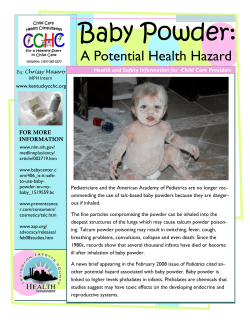
ARTICLES EN ANGLAIS
ARTICLES EN ANGLAIS (Cliquer sur les titres pour voir l’article correspondant) Exposure to harmful phthalates from processed foods and soft drinks ● Phys.org Des chercheurs de l’Université d’Adélaïde ont trouvé un lien entre un régime alimentaire malsain basé majoritairement sur la consommation d’aliments transformés et de sodas, et l'exposition aux phtalates, des substances chimiques couramment utilisées dans les emballages alimentaires plastifiés. p2 Home Depot to remove toxic chemical from vinyl flooring ● money.cnn.com (USA) « Home Depot » sera le premier grand détaillant de retirer de ses rayons les revêtements de sol en vinyle qui contiennent des phtalates. p3-4 Echa, Denmark seek information on uses of phthalates ● Chemicalwatch.com L’Agence européenne des produits chimiques et l’Agence de protection de l’environnement danoise ont lancé un appel à témoignages pour identifier les utilisations actuelles de quatre phtalates (DEHP, BBP, DBP et DIBP) dans certains articles. Les deux agences avaient annoncé leur intention de soumettre une proposition de restriction concernant ces 4 substances plus tôt dans l’année. p5 1 http://phys.org/news/2015-04-exposure-phthalates-foods-soft.html Retour au début Exposure to harmful phthalates from processed foods and soft drinks Apr 16, 2015 University of Adelaide researchers have found another important reason to avoid some processed foods with the discovery of a link between an unhealthy diet and exposure to potentially harmful chemicals – phthalates – that are used in common plastic food wrappings. Academics from the Freemasons Foundation Centre for Men's Health in the University's School of Medicine conducted the first population study to investigate the association between sociodemographic status, lifestyle factors, dietary patterns and exposure of phthalates (a group of chemicals used in plastic) in Australian men. The research is published in the journal PLOS ONE. PhD student Peter Bai says while people are exposed to phthalates ubiquitously, diet was considered as the major contributor in the amount of phthalate exposure according to a number of international studies conducted in US, Europe, Canada and Asia. "Phthalates are widely used in a variety of industrial and consumer products to increase the transparency, flexibility and durability of plastic. They are also used in personal care products, medical devices, medications and dietary supplements," says Mr Bai, lead author on the paper. "Phthalates were detected in 99.6% of the study participants, demonstrating that there is high exposure to the chemicals in urban South Australia, and this is probably representative of all urban Australian areas. "We didn't find a difference in the levels of phthalates detected according to socio-demographic status; however, participants who ate less fresh fruit and vegetables and more processed and packaged foods, and drank carbonated soft drinks, had higher levels of phthalates in their urine," he says. Senior Research Fellow Dr Zumin Shi says while we don't yet know exactly what effect phthalates have on the body, we do know the chemicals impact the endocrine system. "In recent times, there have been increased concerns from the public about phthalates and an association with detrimental health effects such as obesity, diabetes and cardiovascular disease," says Dr Shi. "And in this study we found that phthalates are associated with obesity." "Clearly more research is needed into the health effects of phthalates," he says. Mr Bai says the best way to limit exposure to phthalates is to consume more fresh vegetables, fruit, nuts and fish, and less high fat, packaged and processed foods. "The primary pathway for phthalates exposure is through consuming contaminated food, which is why diet is so important. Phthalates can also be absorbed by inhalation of air or dust containing the chemicals, and through the skin, but the expose is a lot less than if it is consumed," says Mr Bai. Retour au début 2 http://money.cnn.com/2015/04/22/news/companies/home-depot-vinyl-floor-chemical/ Retour au début Home Depot to remove toxic chemical from vinyl flooring By Chris Isidore @CNNMoney Home Depot says it will stop selling vinyl floor containing phthalates, a chemical banned from toys and other kids' products. Home Depot will be the first major retailer to remove a chemical from vinyl flooring that's considered dangerous to children. There are no federal laws or rules prohibiting the group of chemicals known as phthalates from vinyl flooring. But the Consumer Product Safety Commission does limit phthalates to less than 0.1% of the material used in toys and kids' products. "When kids play on the floor, they are exposed just as much as if it's in the toys," said Tony Iallonardo, spokesman for Safer Chemicals, Healthy Families. "It's a major cause of exposure for children." Tests performed recently by that group and the Ecology Center showed that 38 of 65 vinyl floor tiles had phthalates in them. And the tests showed that flooring tiles that do contain phthalates had levels of the chemical between 10 and 90 times greater than the standard for children's toys, according to the Ecology Center's Jeff Gearhart. Children have been found to be particularly at risk to phthalate exposure said Iallanardo, because they're systems are still developing, they tend to have a lot more exposure to floors and put their hands in their mouths alot. The precise risks phthalates pose to humans aren't yet known, but the National Institutes of Health said areas of concern include cancer and hormone disruptions. Hormone problems can cause asthma and learning disabilities Iallonardo said. The public interest groups have been working with Home Depot on the products for more than a year and praised the retailer for making the change. Home Depot (HD) itself did not issue a release about the new policy but confirmed the switch, which will take place by the end of this year. 3 "We think this is an alternative customers will appreciate," said spokesman Stephen Holmes. The safety of flooring products has been getting lots of attention since a 60 Minutes report earlier this year said that laminate wood flooring imported from China by Lumber Liquidators contained dangerous levels of the toxic chemical formaldehyde. Lumber Liquidators (LL) said it is also working with its suppliers to remove phlalates from its vinyl flooring but doesn't have a time frame for when that would take place. "To be clear, all our products -vinyl or otherwise -- are safe for consumers," said the company. Lowe's (LOW) did not have an immediate comment on the effort to remove phthalates from vinyl flooring. Iallonardo says that parents concerned about the flooring in their home should be sure to frequently clean their child's hands and face as well as the floor. Retour au début 4 https://chemicalwatch.com/23673/echa-denmark-seek-information-on-uses-of-phthalates Retour au début Echa, Denmark seek information on uses of phthalates Evidence is to help prepare proposed restriction for DEHP, BBP, DBP and DIBP 29 April 2015 / Europe, Denmark, Priority substances Echa and the Danish EPA have issued a call for evidence to identify the current uses of the four phthalates DEHP, BBP, DBP and DIBP in articles, as well as their content and migration rates. The move is in preparation for a REACH Annex XV restriction dossier. The two agencies announced their intention earlier this year to submit a restriction proposal for the use of the four phthalates in articles (CW 11 March 2015). The agencies say they are approaching the restriction with a view to ban “all uses” in articles, but to use the submitted information “to assess where derogations are required”. They also point out that the call for evidence does not replace the public consultation organised at the start of any restriction process, and that a consultation “could potentially run from March to September 2016, if a restriction proposal is submitted”. They are now seeking information on: uses in articles on the EU market, including flooring, cables and plastic building materials; phthalate content in articles. This should include: o share of plasticised PVC in a certain article; o total share of plasticisers in the article, including those other than DEHP, BBP, DBP, DIBP; o the separate share of each of the four plasticisers in the article; o the frequency or prevalence of these phthalates versus alternatives; o the content of the four phthalates in non-PVC articles; o phthalate migration rates from the articles; o exposure from articles, food and the indoor/outdoor environment; and o information on alternatives, such as the possible (or lack of) technical or economic difficulties for substitution, and prices of alternative plasticisers. The deadline for submitting information is 24 June. The background document for the call for evidence also asks for information on the potential compliance costs that would be generated if a proposed restriction was adopted. Separately to this work, Echa recently appointed consultancy Amec Foster Wheeler and Cowi to collect and assess industry data on the costs, relating to REACH restrictions across the board on substances in articles. Responses are required by 5 June and the work is due be completed, later this year. The link to the questionnaire will be available from 5 May. The consideration and inclusion of information about compliance costs is a standard part of the provisions in REACH Annex XV on the preparation of dossiers for regulatory proposals, and in Annex XVI on socio-economic analysis. The four phthalates are used in a wide and diverse range of articles, including flooring and insulation, construction materials, furniture, swimming accessories, footwear and bags. Retour au début 5
© Copyright 2025









